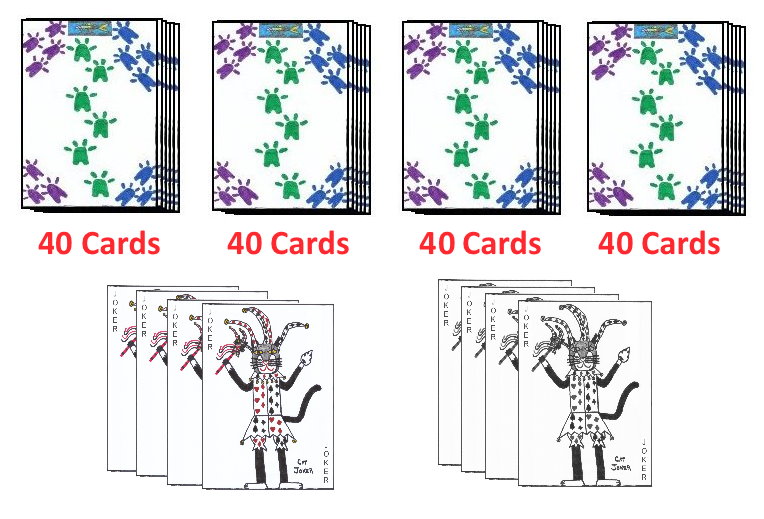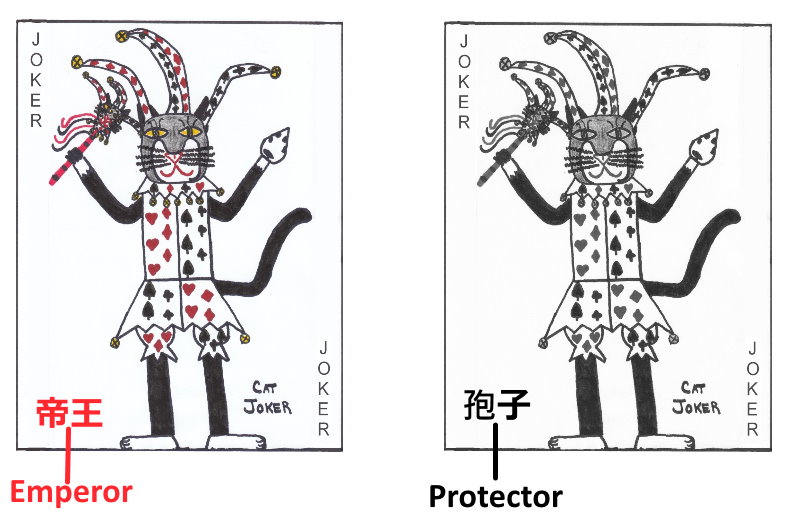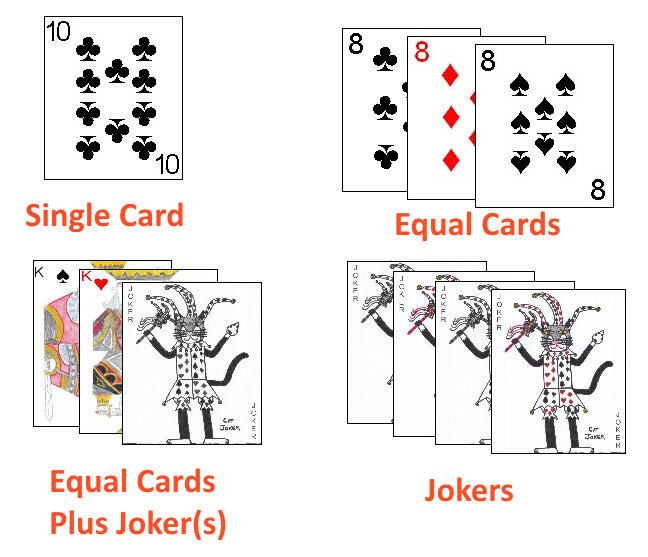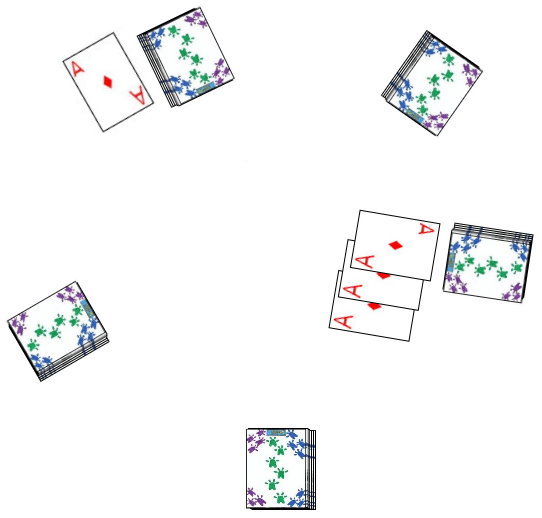 Bao Huang is a Chinese card game of the climbing family which is popular in much of northern China as well as
commonly played online. The name of this game translates to "Protect the Emperor" but is also sometimes shortened to just
Diwang (Emperor).
Bao Huang is a Chinese card game of the climbing family which is popular in much of northern China as well as
commonly played online. The name of this game translates to "Protect the Emperor" but is also sometimes shortened to just
Diwang (Emperor).
Bao Huang is designed for play by five players using a large 168 card deck. This deck can be created by combining four standard 52 card decks together after having removed all the cards of denomination 3, 4, and 5 from those decks. In addition, a total of eight Jokers are added to this deck, four black and white Jokers and four color Jokers. One black and white Joker and one color Joker should also be marked in a simple way to distinguish that as a special card. Thus, one of the color Jokers should be marked as the Emperor and one of the black and white Jokers should be marked as the eunuch or Emperor's protector. These cards will have special significance to the player or players to whom they are dealt. The ranking of the cards in the large deck used for this game are as follows (from high to low): color Joker, black and white Joker, 2, Ace, King, Queen, Jack, 10, 9, 8, 7, 6, 5, 4, 3. In all other aspects this variant is played identically to the base game as described above. color Joker, black and white Joker, 2, Ace, King, Queen, Jack, 10, 9, 8, 7, 6.
Any method can be used to determine the seating positions of the players at the table as well as the player who will shuffle the cards. Once the players are seated at the table, one designated player will thoroughly shuffle the deck and place it in a stack face-down in the center of the table. The traditional Chinese method of "Dealing" is usually used for distribution of cards in this game. The player to the immediate right of the player who shuffled the cards, then cuts the cards, and the player to the immediate right of that player will begin taking cards from the deck. Thus, in this method, each player, starting with that player will take one card from the top of the stock adding it to his hand. This continues in a counter-clockwise direction around the table until the entire deck has been drawn. At the end of this draw, some players will have one more card than other players, which is ok (some players will have 34 such cards and some 35). Players of this game should get accustomed to having hands containing a large number of cards.
 After the cards have been dealt, the player who has, in hand, the marked color Joker is set as the Emperor for this hand. The player who has the specially marked black and white Joker card is set as the Eunuch or Emperors protector. The identity of the Emperor will be quickly known, however the player with the Eunuch card should not make his role known to the other players.
After the cards have been dealt, the player who has, in hand, the marked color Joker is set as the Emperor for this hand. The player who has the specially marked black and white Joker card is set as the Eunuch or Emperors protector. The identity of the Emperor will be quickly known, however the player with the Eunuch card should not make his role known to the other players.
If the player who has the Emperor card chooses not to be the Emperor for the hand he may opt to pass the card to the player to his immediate left. The player to whom this card is passed may then, if he wants to be the Emperor for the hand, take the card into his own hand. He does not give any cards in return for the Emperor card. However, if the player to whom the card is passed also elects not to be the Emperor for the hand, he also may pass the card to his left. This may continue around the table until a player elects to be the Emperor, taking the card into his hand. However if the Emperor card rotates completely around the table, from player to player, and is passed again to the original player it was dealt, that player must take the card back into his hand and set as the Emperor for the hand. The player who was dealt the Eunuch card will then, without revealing this fact to the other players, attempt to assist the Emperor in winning the hand. Thus, the game is a sort of partnership game with the Emperor and the Eunuch playing as partners against the other three players, known as the commoners or farmers. The identify of the Eunuch will usually not be known until that card is played by the possessor of that card. If the same player has both the Emperor card and Eunuch card, he may either attempt to pass the Emperor card to the player as his left, or he may attempt to play solo against the other four players (who will not usually know that player has both cards).
Before play of the hand begins, one or more players may declare their allegiance, which will reveal their specific identity. Thus, one or more farmers may indicate their allegiance as opponents to the Emperor. If this occurs, which is called an uprising, the score for the hand will be doubled. Similarly, the player who has the Eunuch card may declare his allegiance to the Emperor player which will double the score. If both, one or more farmers declare their allegiance and the Eunuch declares his allegiance, the score is quadrupled. If the same player has both the Emperor and Eunuch card, he may also declare this which will double the score for the hand, in addition to another potential double if one or more of the farmer players declare their allegiance.
The object of the game is to be the first team (either the Emperor and the Eunuch or the three farmers) to first run out of cards, with the team to first do so declared the winner of the hand.
The player who currently has the Emperor card makes the first play to the table. This player may make any legal combination consisting of one or more cards. The following are the playable combinations in Bao Huang:

- Single Card: This consists of any single card from the player's hand. A play of a single card can be beat by any higher ranked single card as per the card ordering given previously.
- Equal Cards: This combination is two or more cards of the same rank (suit being irrelevant), but not including any Jokers.
- Equal Cards Plus Jokers: This is a combination of one or more normal cards with one or more Jokers (of the same color or differing colors).
- Jokers: One or more Jokers, which can be of the same color or of differing colors.
Thus, after a player plays the first combination, each player in turn (in a counterclockwise order) has two options. He may either player a combination of the same number of cards which can beat that combination or may pass. If the player plays a higher combination, the next player in turn must then play a still higher combination or pass. This continues until, after a combination is played, the remaining four players all pass in turn (either because they do not have a higher combination or are unwilling to play a higher combination). A player that has previously passed on the same round is not barred from playing when able on a further turn if he prefers. Once a valid play is followed by four consecutive passes in sequence, the player who played that last high sequence then starts a new combination, playing any card from his hand.
If a player through legal plays manages to play his last card, he drops from the hand and the turn moves to the next player to his right. If the player who has run out of cards would had the highest combination in the last round and it would normally be that player's turn to start the next round, the privilege to start the next round passes to the next active player in a counterclockwise direction around the table from that player. This continues until every player in one of the teams has run out of cards while the opposing team still has at least one member still having cards in hand. At this time the hand ends and the team (either the Emperor's team or the farmer's team) which was the first to have all members of that team run out of cards is declared the winner of that hand.
The actual ongoing scores accumulated for each player on each hand are dependent on the order of finish. If the Emperor had a partner, each player scores based on the order of finishing during the hand (regardless of the team which that player was a part of). The following chart shows the scoring based on this finishing order:
|
 |
It should be noted that more than one player may still have cards after one team has finished, the hand will still end, and these players are simply determined to finish in the last positions (for purposes of calculating points to a team at the end of the hand).
The total sum of game points earned by a team should be totaled together, and this total is the number of points each member of that team will receive for the hand.
The Emperor scores double the calculated total for his team, while all other players score the actual number as calculated for that team. If the Eunuch had declared his allegiance before the start of actual play, all game point scores awarded for the hand are doubled, or if one or more farmers had declared their allegiance before the start of actual play, the score is also doubled.
If the Emperor played without the aid of a partner (having both the Emperor and Eunuch cards) and manages to finish first he earns +12 points and each other player must subtract 3 points from their ongoing game score. If the Emperor played alone and finishes second, all players (including the Emperor player) score zero for that hand. If the Emperor played alone and finishes third or later, the Emperor scores -12 game points and each opponent scores + 3 for the hand. If the Emperor had declared he is playing alone, or one or more of the farmers had declared their allegiance, this score is also doubled.
After the first hand of the game, losing players must give tribute to the winning players. After the cards have been dealt, but before any play begins, each member of the team that had lost from the previous hand must place the highest card in his hand that is not a Joker face-down on the center of the table. If the Emperor's team did not win the previous game, he must put his two highest cards in the center of the table. The members of the winning team from the previous hand may then take a card from the table (in the order of having finished in that last hand) and add it to his hand. The Emperor, on the other hand is entitled to take two cards from the table. If the previous hand ended in a 0 game point score, no tribute cards are provided.
After a set number of hands is played, the player with the highest accumulated game point score is declared the game winner.
 Selection of Emperor's Protector: Another variant rule which is sometimes played is to modify the method by which the partner of the Emperor player is selected for the hand. If this optional rule is used, the player who receives the marked Emperor Joker must instead show three cards of the same rank and suit from his hand. The player who has the fourth card of that same rank and suit is set as the Emperors protector on the hand (but normally does not state this fact). If the player who is dealt the Emperor card does not have three such cards of the exact same rank and suit, he must pass the Emperor card to his left. A player may also elect to pass the Emperor card even if they do have three such identical cards but do no want to play as the Emperor during the hand. If the Emperor card is passed by every player, with no player accepting the role of Emperor, it is passed in a counter-clockwise around the table to the first player who does have three identical cards, who is set as the Emperor for the hand. If no player has three cards of the same rank and suit in the hand, all the cards are thrown in for a new deal (the same order of play in this new hand). If a player has all four cards of the same rank and suit and has the opportunity to show the Emperor card, he may simply show three and play solo, not telling the other players he has the fourth card of that set (subsequently earning a higher score at the end of the hand if able to win the hand, as described above). Alternatively, that player can show all four cards, making a declaration which earns an even higher bonus score if that player manages to win the hand.
Selection of Emperor's Protector: Another variant rule which is sometimes played is to modify the method by which the partner of the Emperor player is selected for the hand. If this optional rule is used, the player who receives the marked Emperor Joker must instead show three cards of the same rank and suit from his hand. The player who has the fourth card of that same rank and suit is set as the Emperors protector on the hand (but normally does not state this fact). If the player who is dealt the Emperor card does not have three such cards of the exact same rank and suit, he must pass the Emperor card to his left. A player may also elect to pass the Emperor card even if they do have three such identical cards but do no want to play as the Emperor during the hand. If the Emperor card is passed by every player, with no player accepting the role of Emperor, it is passed in a counter-clockwise around the table to the first player who does have three identical cards, who is set as the Emperor for the hand. If no player has three cards of the same rank and suit in the hand, all the cards are thrown in for a new deal (the same order of play in this new hand). If a player has all four cards of the same rank and suit and has the opportunity to show the Emperor card, he may simply show three and play solo, not telling the other players he has the fourth card of that set (subsequently earning a higher score at the end of the hand if able to win the hand, as described above). Alternatively, that player can show all four cards, making a declaration which earns an even higher bonus score if that player manages to win the hand.